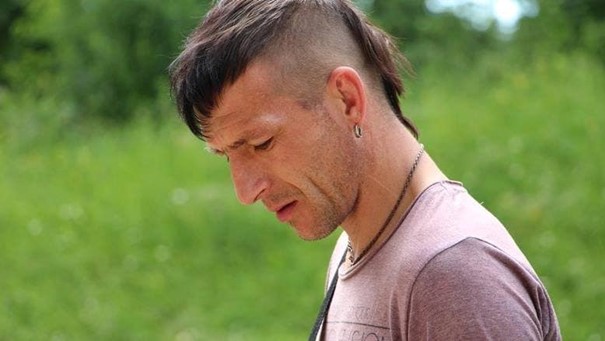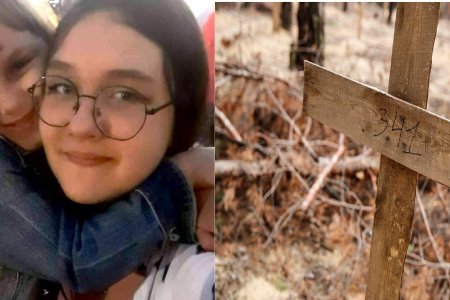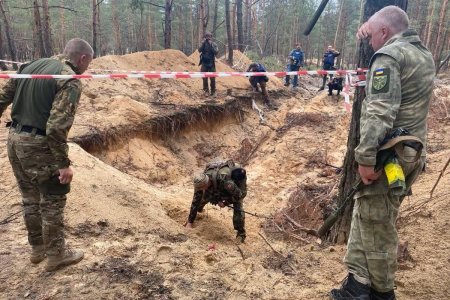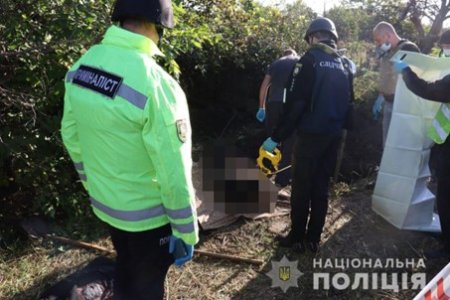
A DNA test has confirmed that the body buried as ‘No. 319’ at the Izium mass burial site is that of Volodymyr Vakulenko. The well-known Kharkiv oblast poet, children’s writer; volunteer and Ukrainian patriot had not been seen since he was seized by Russian soldiers in March 2022. Although his family clearly hoped that Vakulenko had been taken to occupied Crimea or Russia, there were serious fears for his safety even before reports emerged suggesting that his was among the mass graves of Russia’s victims just outside Izium. The fears, tragically, proved justified.
49-year-old Vakulenko lived in Kapytolivka, near Izium in the Kharkiv oblast, and was extremely vocal in expressing his opposition to the Russians’ invasion and seizure of his village. He was bringing up his younger son, Vitaliy, who is underage and has autism. The Russian occupation had severed virtually all contact with Kapytolivka and for a long time it was believed that Vitaliy had been abducted, together with his father.
According to an investigation * carried out by Maksym Sytnikov and Tetiana Teren from PEN Ukraine, the Russians did initially take both Volodymyr and his son away on 22 March. On that occasion, they were, however, freed. Vakulenko clearly understood that the Russians would be back, and buried the diary he had kept since the full-scale invasion under a cherry tree in the garden. Ukrainian writer Victoria Amelina reported on 23 September that she had visited Vakulenko’s parents in Kapytolivka, and had, together with his father, dug up the diary and taken it away. It has since been passed to the Kharkiv Literary Museum.
On 24 March, the Russians turned up again and took Vakulenko away in the direction of Izium. That was the last time that he was seen alive, however the invaders themselves returned more than once and carried out searches.
Proof of Russian crimes began emerging immediately after the invaders were driven out of Izium and areas around it at the beginning of September. This included a mass burial site in the forest just outside Izium containing well over 400 bodies. Some of the bodies had hands bound or showed other signs of torture. Others, in at least one case three generations of a family, had been killed in the Russia’s relentless shelling and bombing of residential buildings and other civilian targets. Fortunately, many employees of a major Izium funeral company disregarded threats from the invaders and continued burying people and also tried, as much as possible, to identify those killed. In the funeral company’s logbook, grave No. 319 gave Vakulenko’s name. There was also a photo of the body taken before burial, with this showing the writers’ documents, with gunshots through them..
Although Volodymyr Vakulenko was the laureate of several Ukrainian and international awards, it is quite possible that the Russians who probably tortured, before killing him, had no idea that he was a writer and poet. It was his staunch pro-Ukrainian position and open opposition to the Russian occupation, as well as his activities as a volunteer, helping the Ukrainian Armed Forces, that made him a target. Most disturbingly, it seems likely that there were pro-Russian residents of Kapytolivka with whom he was earlier in conflict, who would have been willing to denounce Vakulenko to the Russian invaders.
From the end of February, Vakulenko’s former wife, Iryna Novitska, had tried to persuade him to leave Kapytolivka, together with their son.. He had refused, and not only for practical reasons such as because he needed to care for his father who was recovering from a stroke. His ex-wife explained to PEN Ukraine that Vakulenko constantly replied that he couldn’t abandon “the lads” [defending Ukraine on the battlefield] and that “this is my country”. Although it became impossible to leave after the Russians seized the village, it seems likely that Vakulenko would still not have agreed, for all his clear understanding of the danger he faced from the Russian invaders.
* The study was initially published by Ukrainska Pravda, but is also available on the PEN Ukraine site in Ukrainian and English



